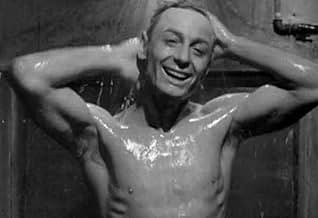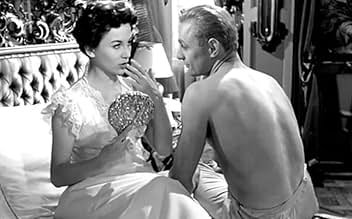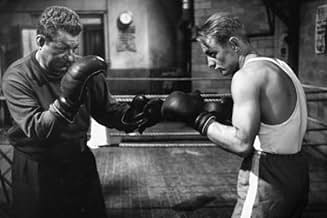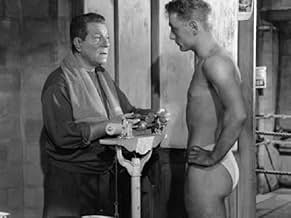L'air de Paris
- 1954
- Tous publics
- 1h 50min
NOTE IMDb
6,8/10
773
MA NOTE
L'histoire d'André Menard, un jeune boxeur amateur prometteur issu d'un milieu pauvre encadré par un ancien boxeur professionnel, Victor Le Garrec, et dont la carrière s'effondre lorsqu'il t... Tout lireL'histoire d'André Menard, un jeune boxeur amateur prometteur issu d'un milieu pauvre encadré par un ancien boxeur professionnel, Victor Le Garrec, et dont la carrière s'effondre lorsqu'il tombe amoureux de la riche Corinne.L'histoire d'André Menard, un jeune boxeur amateur prometteur issu d'un milieu pauvre encadré par un ancien boxeur professionnel, Victor Le Garrec, et dont la carrière s'effondre lorsqu'il tombe amoureux de la riche Corinne.
- Réalisation
- Scénario
- Casting principal
- Récompenses
- 1 victoire et 1 nomination au total
Mathilde Casadesus
- Voyageuse
- (as Mathilde Casadessus)
Séraphin Ferrer
- Boxer
- (as Sébastien Ferrer)
Roger Michelot
- Coach
- (as L'entraîneur Roger Michelot)
Jean Bellanger
- Le voyageur sortant de la gare
- (non crédité)
Avis à la une
This was the last movie that Jean Gabin and Arletty made together for Carné, the absence of Jacques Prévert as screenwriter (as he was on Le Jour Se lève) shows, the plot is rather confused and indecisive. Nevertheless, the photography on location in 1950s Paris is beautiful, many shots look like Brassai photographs, and the climactic scene in the seedy local boxing-ring has some of the same atmosphere as the great scenes in the popular theatre in Carné's masterpiece, "Les Enfants du Paradis". Arletty, by then over 50, is experimenting with playing a less glamorous, rather frumpy part, but she is still fascinating to watch. The thrill is in the ambiguous relationship between Gabin, as the ageing boxing coach, and his blond, sometimes hysterical protégé. There is an extraordinary scene in which he goes to get him back, when the boy has run away and is living in a run-down Algerian hostel. It isn't a great film, on the level of Hotel du nord or Les Portes de La Nuit, but it is well worth seeing for anyone curious about the French cinema in the period between the Occupation and the beginning of the Nouvelle Vague. It is available on video in France.
There are interesting films in Carné's post Prévert career:"Thérèse Raquin" and "les tricheurs",to name but two.But this one is not among them.The screenplay,written by Carné and Jacques Sigurd -who was also Yves Allégret's best script writer- is rather weak and the dialogs seem to have been made" in the style of Jacques Prévert",but few lines are really potent.This is the clichéd story of a poor young man of whom a former boxer(Gabin) wants to make a champion.But his wife(Arletty) is not prepared to it and gets in the way.Besides ,the relationship between the poor lad -an orphan who always loses-and a posh girl (à la "Rose and Jack" in a movie whose name escapes my mind)never rings true.
15 years had passed since Carné directed Gabin and Arletty in his masterpiece "le jour se lève" and time had really taken its toll.Both seem jaded,particularly Arletty whose part is thankless .You should try Julien Duvivier's "sous le ciel de Paris" instead of this.That's really old hat!
15 years had passed since Carné directed Gabin and Arletty in his masterpiece "le jour se lève" and time had really taken its toll.Both seem jaded,particularly Arletty whose part is thankless .You should try Julien Duvivier's "sous le ciel de Paris" instead of this.That's really old hat!
L'Air de Paris, a film about the dreams and realities of a young boxer by the name of André Menard (Lesaffre) is set in 1950's Paris. The film starts rather slowly and the plot only picks up towards the middle of the film as André and his bourgeois love interest Corinne (Daëms) begin to get closer together. The difference of class status between the two makes compelling viewing, especially when Corinne attends a boxing match to watch André fight, largely frequented by the rowdy, working class Parisian faithful. The boxing scenes are convincing with Jean Gabin playing the role of André's coach effectively as the wise old ex-professional. In the earlier scenes of the film, Gabin and Arletty really connect and seem very natural alongside each other. The underlying theme is of the internal struggle of André and Corinne to break free from their social backgrounds and from being stereotyped by society and their close friends. This film is a tale of two classes.
Boxer drama by Marcel Carne with Jean Gabin and Arletty
You wouldn't necessarily have expected EUROPEAN FILM AWARD winner (h.c.) Marcel Carne to present an athlete drama to his audience. He doesn't reach the level of his masterpieces HAFEN IM NEBEL / HARBOR IN THE FOG and KINDER DES OLYMP / CHILDREN OF OLYMP, but the film is definitely worth seeing.
The ex-boxer Victor Le Garrec (Jean Gabin) runs a small boxing studio in Paris. His wife Blanche (Arletty) begs him to give it up, but Victor still dreams of making a young boxer a champion. A success that eluded him. One day he accidentally meets the young Andre Menard (Roland Lesaffre), who turns out to be a great boxing talent. It's just a shame that Andre has fallen for the enchanting model Corinne (Marie Daems). Despite all the physical attraction, two different worlds collide. This becomes clear when Andre is introduced to Corinne's friend Chantal (Simone Paris) and fashion designer Jean-Marc (Jean Paredes). The young boxer has to decide: true love or a great sports career. Victor has a lot of work to do. The Italian immigrant family Posi (Maria-Pia Casilio, Folco Lulli with Ave Ninchi as their daughter Angela), who run a small shop right next to the boxing studio, provide a little Parisian little people color. Andre's first boxing fight is coming up soon...
For his role, Jean Gabin was awarded the Coppa Volpi for Best Actor at the Venice Film Festival in 1954. Unfortunately, the wonderful Arletty remains a bit pale in this film. The master director's main focus is on his favorite actor Roland Lesaffre. No boxer was lost on him, but his well-trained body does stand out. Whether in the shower, in the boxing ring or during a massage: the camera practically celebrates Lesaffre. That's not enough for an impressive story, but with the actors and the director, the result is still an above-average classic.
You wouldn't necessarily have expected EUROPEAN FILM AWARD winner (h.c.) Marcel Carne to present an athlete drama to his audience. He doesn't reach the level of his masterpieces HAFEN IM NEBEL / HARBOR IN THE FOG and KINDER DES OLYMP / CHILDREN OF OLYMP, but the film is definitely worth seeing.
The ex-boxer Victor Le Garrec (Jean Gabin) runs a small boxing studio in Paris. His wife Blanche (Arletty) begs him to give it up, but Victor still dreams of making a young boxer a champion. A success that eluded him. One day he accidentally meets the young Andre Menard (Roland Lesaffre), who turns out to be a great boxing talent. It's just a shame that Andre has fallen for the enchanting model Corinne (Marie Daems). Despite all the physical attraction, two different worlds collide. This becomes clear when Andre is introduced to Corinne's friend Chantal (Simone Paris) and fashion designer Jean-Marc (Jean Paredes). The young boxer has to decide: true love or a great sports career. Victor has a lot of work to do. The Italian immigrant family Posi (Maria-Pia Casilio, Folco Lulli with Ave Ninchi as their daughter Angela), who run a small shop right next to the boxing studio, provide a little Parisian little people color. Andre's first boxing fight is coming up soon...
For his role, Jean Gabin was awarded the Coppa Volpi for Best Actor at the Venice Film Festival in 1954. Unfortunately, the wonderful Arletty remains a bit pale in this film. The master director's main focus is on his favorite actor Roland Lesaffre. No boxer was lost on him, but his well-trained body does stand out. Whether in the shower, in the boxing ring or during a massage: the camera practically celebrates Lesaffre. That's not enough for an impressive story, but with the actors and the director, the result is still an above-average classic.
Following his break with Jacques Prévert, the post-war films of Marcel Carné, with the notable exception of 'Les Tricheurs', were to receive a decidedly mixed response and he was pretty well written off by the New Ripple brigade. The original screenplay for his masterpiece of Poetic Realism 'Le Jour se leve' was written by Jacques Viot whose novel 'La Choute' has here been adapted by another Jacques, this time Jacques Sigurd.
Carné has called upon his tried and trusted team of cinematographer Roger Hubert, composer Maurice Thiriet and editor Henri Rust whose editing of the film's only boxing scene is exceptional. He has also reunited Jean Gabin and Arletty, both of whom enrich every film in which they appear. The younger generation is represented by Carné's 'protegé' Roland Lesaffre, as an aspiring boxer who punches above his weight when falling for the society girl of Marie Daems. Theirs is a relationship that cannot last and although neither Monsieur Lesaffre nor Mlle Daems were destined to set the screen alight, they convince here under Carné's sensitive direction. Some might detect in the amitié between Victor and André an element of homophilia but that of course is down to the individual viewer.
Arletty's fall from grace as a result of 'horizontal collaboration' during the Occupation has been well documented but her no-nonsense style of acting never ceased to impress, whatever the material. Gabin as an ex-boxer, complete with cauliflower ears, makes the role his own and is simply one of the 'truest' actors ever to walk on to a sound stage.
Compared to other films based around the Ring, this one is lightweight to be sure but in its own quiet way, still packs a punch.
Carné, a director of finesse and innate humanity, remained philosophical about his negative reviews. "I always run the risk of falling on my face, which has in fact happened."
Carné has called upon his tried and trusted team of cinematographer Roger Hubert, composer Maurice Thiriet and editor Henri Rust whose editing of the film's only boxing scene is exceptional. He has also reunited Jean Gabin and Arletty, both of whom enrich every film in which they appear. The younger generation is represented by Carné's 'protegé' Roland Lesaffre, as an aspiring boxer who punches above his weight when falling for the society girl of Marie Daems. Theirs is a relationship that cannot last and although neither Monsieur Lesaffre nor Mlle Daems were destined to set the screen alight, they convince here under Carné's sensitive direction. Some might detect in the amitié between Victor and André an element of homophilia but that of course is down to the individual viewer.
Arletty's fall from grace as a result of 'horizontal collaboration' during the Occupation has been well documented but her no-nonsense style of acting never ceased to impress, whatever the material. Gabin as an ex-boxer, complete with cauliflower ears, makes the role his own and is simply one of the 'truest' actors ever to walk on to a sound stage.
Compared to other films based around the Ring, this one is lightweight to be sure but in its own quiet way, still packs a punch.
Carné, a director of finesse and innate humanity, remained philosophical about his negative reviews. "I always run the risk of falling on my face, which has in fact happened."
Le saviez-vous
- AnecdotesIn the Italian post-synchronized version, the actors are dubbed by: Emilio Cigoli (Jean Gabin), Lydia Simoneschi (Arletty), Stefano Sibaldi (Roland Lessaffre) and Vinicio Sofia (Folco Lulli). Maria Pia Casilio who was still on location in France filming Thérèse Raquin (1953) was not able to get back to Rome in time for the post synchronization so it was Rosetta Calavetta who lent her voice for the role of the shy Maria Pozzi. Only Ave Ninchi ended up dubbing herself.
- Versions alternativesSome copies include the song "La ballade de Paris" sung by Yves Montand as an introduction before the opening credits.
- ConnexionsFeatured in Cinema: Alguns Cortes - Censura III (2015)
Meilleurs choix
Connectez-vous pour évaluer et suivre la liste de favoris afin de recevoir des recommandations personnalisées
Détails
- Date de sortie
- Pays d’origine
- Langues
- Aussi connu sous le nom de
- Air of Paris
- Lieux de tournage
- Sociétés de production
- Voir plus de crédits d'entreprise sur IMDbPro
- Durée1 heure 50 minutes
- Couleur
- Rapport de forme
- 1.37 : 1
Contribuer à cette page
Suggérer une modification ou ajouter du contenu manquant

Lacune principale
By what name was L'air de Paris (1954) officially released in India in English?
Répondre


























